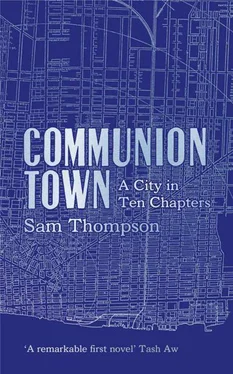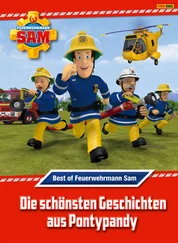In the canteen, halfway through the shift, Fischer spoke to me. His gaze travelled all the way from my breastbone up to the top of my head, and he asked: ‘What do they feed you ?’ But before I could answer he turned his attention to a couple of new arrivals, skinny young men with livid faces, and told them a story from another place he’d worked. A rookie slaughterman on his first day there had slipped in a puddle, cracked his head on a steel rail and fallen into the knocking pen. The other slaughterers were in such a hurry they grabbed him by the ankles, strung him up and sent him along the line. His lights were down the chute and his two flanks swinging in opposite directions before anyone knew what had happened.
The young men gazed at the tabletop, at the headlines telling us FLÂNEUR KILLS AGAIN. He was full of stories like that, I would discover, about slaughterers being knocked into scald tanks, or mistaking hands for trotters, or stepping outside in their work gear and sending grown men into hysterics. He didn’t mind that half his audience couldn’t understand him and the other half didn’t want to know.
‘One place,’ he said, ‘it was swine same as here, but we stunned them with carbon dioxide. They go through the well, get a lungful, don’t feel a thing. But that night there was something wrong with the mixture. They were halfway down the line, some of them, but they started waking up, and I promise you they sounded exactly like people when they screamed. Whole place echoing like a church. No one knew what to do. In the end I had to go round with a knife. It was an hour’s work before the noise stopped. And when we took off our helmets you know what had happened? The hair of every person on that floor had turned pure white.’ While he spoke I sat silent, slouched in my own thoughts of the night Market, stains spreading black in the lamplight and a white-haloed, featureless face. He ended his story with a laugh and turned to me as if I’d challenged him, but I had nothing to add. I didn’t doubt that what he said was true.
The night after that, he strolled through the mayhem, took up a position a few feet away from where I was working and folded his arms. I glanced up at him, breathing hard, then stooped to the trough and hauled another half-dozen animals through. When I looked again he was still there, his safety goggles reflecting one of the striplights so that a glaring white bar hid the upper half of his face.
I knew what he was at. He’d seen that I was different from the rest, and he didn’t like it. He knew that I was a craftsman, and that was unacceptable to him: he wanted nothing in this room but straining flesh and labouring blades. Very well, I thought. I didn’t make mistakes on the killing floor, so he could watch as long as he liked. I could work hour after hour without a slip. I wouldn’t be rattled. I knew the knocker would be gaping at this diversion and working even more sloppily than before, but I kept my head down. I don’t make mistakes, but still, this wasn’t fair: under Fischer’s scrutiny my boots and gloves were heavy, and cramps rippled down my back, stiffening my hand. I clenched my fist and the wound stung as the newly mended tissues came apart. All I needed was half a minute’s rest, but hooks were sliding past empty on the bleed rail and the animals were building up beyond the knocking pen.
The knocker fired the bolt and opened the gate, and I swung myself heavily around, but the timing must have been wrong because my heel shot out from under me and I found myself lying on my back beneath a suffocating weight. My hard hat had cracked on the concrete and purple rings were spreading across my field of vision. I couldn’t catch my breath, or find enough purchase to free myself from the barrowload of hot wet flesh under which I was buried.
A moment later the inert animal was rolled off my chest, and as I gulped for air Fischer braced, heaved, and hooked the trotter on the rail. Then he strode off in search of his next intervention. Job done. There was nothing left to see over here but a few splatters up the walls.
After that I worked in a picture-show of revenges. Who would have guessed he had such a power to fascinate? Soon I was thinking of him all the time, his loose twist of a smile, his arrogant technique with the knife. I knew when he stepped on to the floor because my flesh tightened and prickled from scalp to fingertips. I had not spoken a syllable in his presence but I spent nights denouncing him in the private courtroom of my skull. I knew every detail of his face, with its pitted cheeks and its nose that might have been squeezed out of a tube. When he humiliated an underling I could taste his satisfaction. I studied the torsion of his wrist: I could have sworn I’d known it always, that flick of the knife.
Afterwards, I could not tell when the idea was born: the most important idea I have ever had. There was no flash, no revelation. Instead, as I was dragging on my street clothes at the end of another shift, I became aware of a notion lying hidden in a fold of my mind, waiting to be noticed. It was frail and incomplete, no more than a seed, but I could tell that if I took care of it it would grow. The idea offered itself in two images. First, Fischer supervising the shift, goggles unblinking, hands by his sides, feet planted wide on the killing floor as the production line thrashed all around him. Second, that faceless figure in the Strangers’ Market, watching across the body of his victim to see what I would do. Two images, and a question. What is the difference?
The good slaughterer belongs only on the killing floor. At dawn, when he crosses the threshold of the abattoir, he must disappear. He must forget the version of himself which knows how simple it is to end the lives of warm-blooded animals, because that is not a person we want walking around the city.
And yet, in the city, the Flâneur.
SICK SLAUGHTER. The papers loved him. CARNAGE IN STONE LANES. When I found the canteen empty I opened the pages out on the Formica and caught up with developments. LAMBS TO THE SHAMBLES. They said that he must be skilled either in surgery or in butchery. COPS BAFFLED. The television that gesticulated away to itself on the counter had a fixation with him too, but I never dared turn up the sound. DON’T GO OUT AT NIGHT. I kept a eye on the images of police jerkins loitering near ambiguous sections of brickwork. RAW HEAD AND BLOODY BONES.
Why did we want to know? The screen showed graphics of a figure with a question mark for a face, and on the radio in my lodgings, when I could coax voices out of the fuzz, they described his tools and his psychopathology. The papers had a photograph of the latest one to cross his path: it showed her young self in sunny times, her eyes slitted, the light intense. She thought she was in one kind of story until he proved to her that she was in another. And what is she now? A few facts, craning out like struts in the wreck of a burnt house. If I understood anything about the Flâneur, it was that his actions held no interest. He had nothing to tell us.
The Flâneur of Glory Part. A stagy figure, with his straight blade and his risible air of Victoriana. Some crass newspaperman had awarded him the nickname because, if we knew nothing else, we knew that each of his victims had encountered him walking in the streets of the city. He was around every corner in the fogs which the season brought. When I set off for work with night fanning out across Glory Part, I knew I was entering his jurisdiction, and when I fell asleep in the early morning — so finished by the night’s work that oblivion came in the time it took my body to pass through a quarter circle, face first, into my bed — it was like falling into his arms.
But it was pitiable, the way he scrawled his marks on the walls as though he expected us to look there for what he had to tell us. As though his clever clues would be puzzled over and then pursued along the alleyways by brilliant detectives and assiduous constables. There was no great mystery about him. Anyone can become what he was. Nothing. A mask stuffed with straw. A bad thing that happens.
Читать дальше
Конец ознакомительного отрывка
Купить книгу












